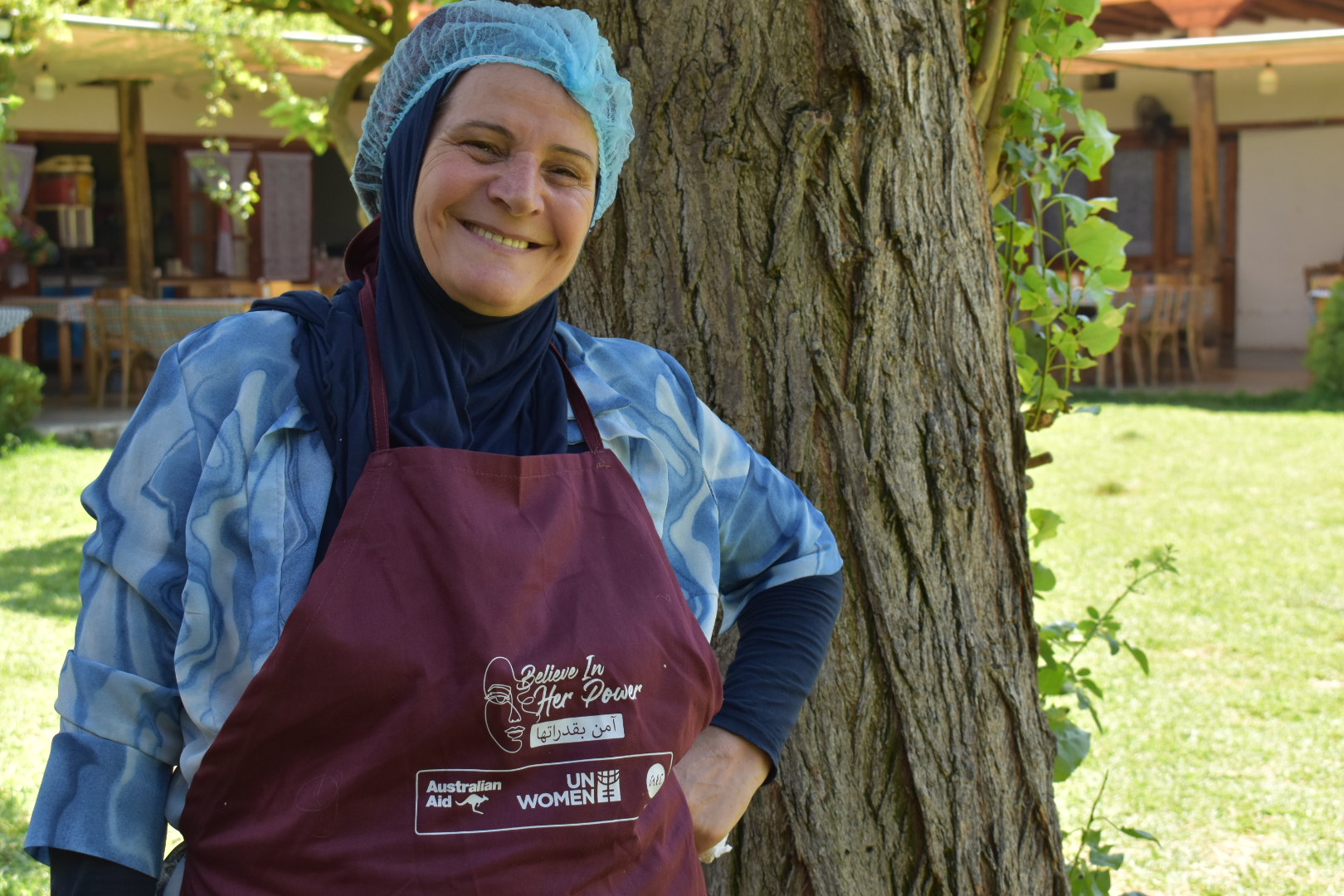In the words of Rajaa: “Through shared laughter and collaborative meal preparations, I found solace and a newfound sense of community”
Date:
Rajaa Ibrahim Zaarour, a 58-year-old resident of Marj, a village in Lebanon's Bekaa Valley, 52.8km away from Beirut, is an inspiring example of strength and transformation in the face of adversity.
Rajaa's narrative unfolds against the backdrop of familial responsibility as she dedicates herself to caring for her 88-year-old father, who grapples with the consequences of a Thrombus-induced paralysis. She participated in a community kitchen supported by UN Women, led by Arcenciel, and funded by the Government of Australia, where she received cash-for-work for 60 days.

“Born with a disability that causes hip ailment and a limp, I faced societal scrutiny from my community and did not know how to deal with persons with disabilities. Growing up, I experienced persistent taunts and disdainful glances emblematic of my perceived "otherness.” I often asked myself, "Why am I not normal?" I later realized that this question resonated with those navigating life with disabilities, and I am not the first to ask it.
My marriage introduced its own set of challenges, exacerbated by financial difficulties and my ex-husband's health concerns. My husband's financial struggles caused him to act out aggressively with jealousy and unjustifiable actions. On top of that, my in-laws always treated me as if I didn’t deserve their son because of my disability, even though their son had paralysis. It all became suffocating for both of us and eight years ago, we decided to divorce.
After my divorce, I felt liberated. I moved back with my father, who also suffers from paralysis induced by Thrombus and requires a lot of attention and care. Every moment of my time was devoted to his service, from preparing meals to tidying up. I experienced a sense of despair as I had no personal time, and it felt like my life was only for the benefit of others.
A few months back, I was introduced to the Arcenciel community kitchen initiative, a transformative endeavor supported by UN Women. The community kitchen was presented as merely a place of temporary employment, but it quickly evolved into a sanctuary for me. Through shared laughter and collaborative meal preparations, I found solace, purpose, and a newfound sense of community.
Every day for three months, I would arrive at the kitchen at 8:30 am and make Turkish coffee for me and my coworkers. We sit together, share stories, and start working at 9:00 am. We prepared the food and cooked familiar meals for the Lebanese community, like Mloukhiyeh and Moghrabieh, then packaged the meals to be delivered to families living in vulnerability.
The project has provided financial stability and reignited my passion for culinary arts—a skill I have always enjoyed doing. Each day, as I peeled potatoes and chopped tomatoes, I discovered joy and fulfillment in cooking for my community.
The community kitchen has become a space where I felt empowered, forming connections within a community that embraces my uniqueness. My journey resonates with the collective narrative of individuals who, despite facing adversity, contribute to a more inclusive, compassionate, and sustainable world—one meal, one act of caregiving at a time."
As part of the UN Women project "Humanitarian Assistance to Women by Women: Women at Work to reduce period poverty and food insecurity in the Lebanon Crisis," in partnership with Arcenciel and with the generous support of the Government of Australia, aimed at reducing period poverty and food insecurity during the Lebanon Crisis, Rajaa's story, along with that of 290 women working in seven UN Women community kitchens, illustrates the transformative impact of community-driven initiatives. Over 1,500 households have received more than 120,000 well-balanced meals through community kitchens, which have benefited over 5,700 people so far. By providing hot meals to those in need, these kitchens have helped people save on food expenses while ensuring that they have enough to eat. This has allowed vulnerable families to allocate their saved funds to other necessities.